Iran is reeling from Israel's unprecedented attack - and it is only the start

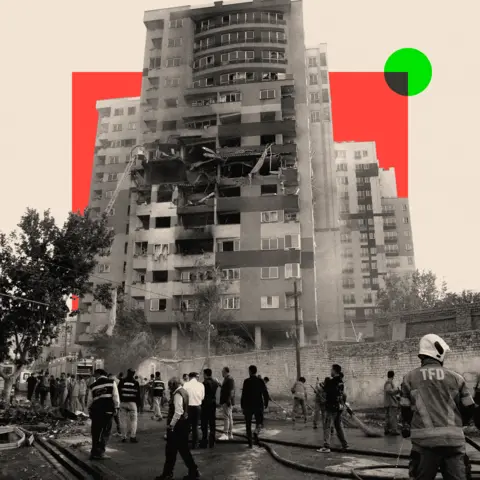 BBC
BBCIsrael's "Operation Rising Lion", as it calls its attack on Iran, is unprecedented. It is vastly more extensive and ambitious than anything that has come before, including the two missile and drone exchanges it had with Iran last year. For Iran, this is the biggest assault on its territory since the Iran-Iraq War of 1980-1988.
In the darkest hours before dawn the Israeli Air Force targeted not just sites linked to Iran's nuclear programme but also the country's air defences and ballistic missile bases, thereby reducing Iran's ability to retaliate.
On the ground and in the shadows, the network of operatives working for Mossad, Israel's overseas intelligence agency, reportedly helped to pinpoint the exact location of key figures in both the military command and nuclear scientists.
Those killed overnight include the head of Iran's Islamic Revolutionary Guards Corps (IRGC), the guardians of the Islamic Revolution that overthrew the Shah's regime in 1979, as well as the head of the mainstream armed forces and the head of the IRGC air force. Iran says at least six of its scientists have been killed.
Once again, Israel's spy agency is shown to have successfully penetrated the very heart of Iran's security establishment, proving that no one there is safe.
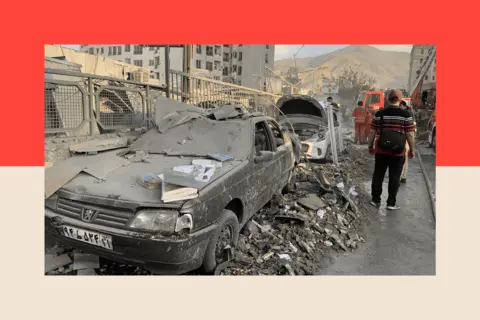 Getty Images
Getty ImagesIran's state TV reported that 78 people were killed and said that civilians, including children, were among the dead. (This is an unofficial figure and has not been independently verified.)
Mossad was reportedly able to launch drones from inside Iran as part of this attack. The primary targets of this whole operation have been the nuclear enrichment facility at Natanz and bases belonging to the IRGC. For Israeli military planners, this has been a long time coming.
Iran is reeling and this may be only the first wave. There will be many more potential targets on Israel's hitlist, although some may be beyond its reach, buried deep underground in reinforced bases beneath solid rock.
So what has led to this attack by Israel and why now?
Curbing Iran's nuclear programme
Israel, and several Western countries, suspect that Iran has been secretly working towards what is called "breakout capability", meaning the point of no return in developing a viable nuclear weapon.
Iran denies this and has always insisted that its civil nuclear programme – which has received help from Russia – is for entirely peaceful purposes.
For more than a decade Israel has been trying, with varying degrees of success, to slow down and set back Iran's nuclear progress. Iranian scientists have been mysteriously assassinated by unknown assailants, the military head of the nuclear programme, Brig-Gen Fakhrizadeh was killed by a remote-controlled machine-gun on a lonely road near Tehran in 2020.
Before that, US and Israeli cyber sleuths were able to insert a devastating computer virus, codenamed Stuxnet, into Iran's centrifuges, which caused them to spin out of control.
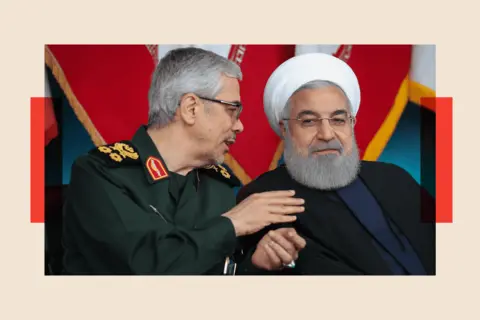 Getty Images
Getty ImagesThis week the UN's nuclear watchdog, the International Atomic Energy Agency (IAEA), found Iran to be in breach of its non-proliferation obligations and threatened to refer it to the UN Security Council.
Many of the concerns over Iran's nuclear programme arise from its stockpiling of highly enriched uranium (HEU) that has been enriched up to 60 per cent, far beyond the level needed to generate civil nuclear power and a relatively short hop to the level needed to start building a bomb.
There was a deal to curb Iran's nuclear programme. It was concluded in 2015 during the Obama presidency, but Donald Trump called it "the worst deal in the world" and when he got into the White House he pulled the US out of it. The following year Iran stopped complying with it.
Nobody outside Iran wants the Islamic Republic to possess the nuclear bomb. Israel, a small country with much of its 9.5 million-strong population concentrated in urban areas, views a nuclear-armed Iran as an existential threat.
It points to the numerous statements by senior Iranian figures calling for the destruction of the State of Israel. Saudi Arabia, Jordan and the Gulf Arab states don't much care for Iran's revolutionary Islamic Republic regime but they have learned to live with it as a neighbour.
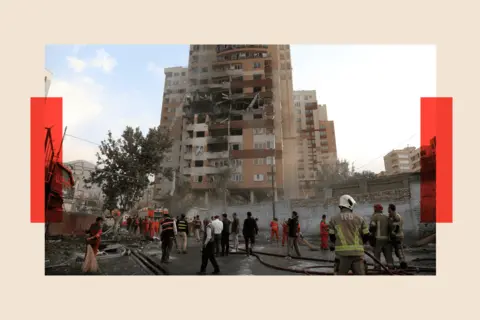 Getty Images
Getty ImagesThey will now be extremely nervous about the risks of this conflict spreading to their own shores.
For Israel, the timing was crucial. Iran has already been weakened by the effective defeat or elimination of its proxies and allies in Lebanon, Syria and Gaza. Its air defences were heavily compromised after last October's attacks by Israel.
There is a sympathetic president in the White House and lastly, Israel reportedly feared that some of Iran's key uranium enrichment equipment was about to be moved deep underground.
Where does this go from here?
It is clear what Israel wants by this operation: it is aiming to, at the very least, set back Iran's nuclear programme by years. Preferably it would like to halt it altogether.
There will also be many in Israel's military, political and intelligence circles who will be hoping that this operation could even so weaken Iran's leadership that it collapses altogether, ushering in a more benign regime that no longer poses a threat in the region. That may be wishful thinking on their part.
President Trump said on Friday that Iran had "a second chance" to agree to a deal. A sixth round of US-Iran negotiations was due to take place in Muscat on Sunday but Israel does not set much store by these talks.
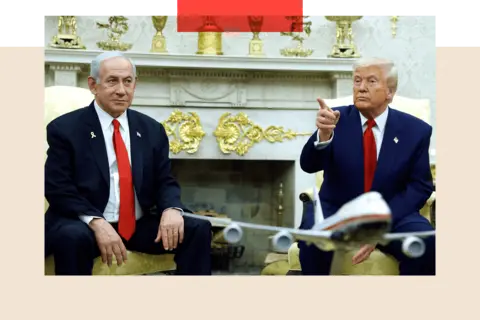 Getty Images
Getty ImagesJust as Russia is accused of stringing along Trump over peace talks with Ukraine, Israel believes Iran is doing the same here.
Israel believes this is its best and possibly last chance to kill off Iran's suspected nuclear weapons programme.
"Israel's unprecedented strikes across Iran overnight were designed to kill President Trump's chances of striking a deal to contain the Iranian nuclear programme," says Ellie Geranmayeh, Senior Policy Fellow at the European Council on Foreign Relations (ECFR).
"It is clear their [the attacks] timing and large-scale nature was intended to completely derail talks."
Washington has gone to some lengths to relay to Iran that it was not involved in this attack. But if Iran decides to retaliate against any of the many US bases in the region, either directly or via its proxies, then there is a risk the US could get dragged into yet another Middle East conflict.
Iran's Supreme Leader Ayatollah Ali Khamenei has vowed "harsh punishment" for Israel but Iran is in a much weaker position today than it was two years ago and its options for retaliation are limited.
Talk of a nuclear arms race
There is, however, an even bigger risk here. Israel's operation could still backfire, triggering a nuclear arms race.
Hardline hawks inside Iran's security establishment have long argued that the best deterrence against future attacks by Israel or the US would be for it to acquire the nuclear bomb. They will have taken note of the differing fates of leaders in Libya and North Korea.
Libya's Colonel Gaddafi gave up his Weapons of Mass Destruction programme in 2003; eight years later he was dead in a ditch, overthrown by the Arab Spring protests that were backed by Western air power.
By contrast, North Korea has defied all international sanctions to build up a formidable arsenal of nuclear warheads and intercontinental ballistic missiles, enough to make any potential attacker think twice.
Whatever the final damage amounts to from Israel's Operation Rising Lion, if Iran's regime survives – and it has defied the odds before – then there is a risk it will now accelerate its race towards building and even testing a nuclear bomb.
If that happens then it will almost inevitably trigger a nuclear arms race in the Middle East, with Saudi Arabia, Turkey and possibly Egypt all deciding they need one too.
BBC InDepth is the home on the website and app for the best analysis, with fresh perspectives that challenge assumptions and deep reporting on the biggest issues of the day. And we showcase thought-provoking content from across BBC Sounds and iPlayer too. You can send us your feedback on the InDepth section by clicking on the button below.
